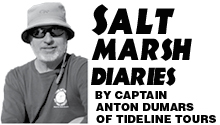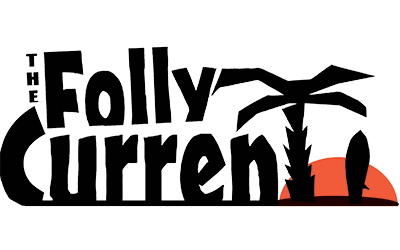 I sat across the glass top desk from Mary Brent and Sharon. We gathered to hash out details of the upcoming Southern Sampler Artist Colony Saltmarsh Adventure. I didn’t recognize Sharon. I’d only known her dressed in character as the Gullah Lady. “Words and Rhythm …. that’s our theme,” said Mary Brent. “How can you bring the marsh into this, Anton?”
I sat across the glass top desk from Mary Brent and Sharon. We gathered to hash out details of the upcoming Southern Sampler Artist Colony Saltmarsh Adventure. I didn’t recognize Sharon. I’d only known her dressed in character as the Gullah Lady. “Words and Rhythm …. that’s our theme,” said Mary Brent. “How can you bring the marsh into this, Anton?”
“The marsh has a natural rhythm. It breathes in and breathes out twice a day with a beat as steady as a metronome,” I said. “It’s a common rhythm shared with all who live in or visit the marsh.” I looked at Sharon and said “I’m sure you do things in your marsh just like we do things in our marsh.”
Shortly, we wrapped up the meeting. Sharon and Mary Brent departed. An hour later, I sat horrified, having recalled the “your marsh/our marsh” statement.
Since age 11, I lived in the small towns of northern Florida and southern Alabama. I didn’t consider myself prejudiced. I played sports and music with blacks and whites. I had black friends at school. Yet seldom did I see a black person at a social function. After school co-mingling was rare. In fact, students at my high school held separate proms for blacks and whites. This was my south of the 1970s. At age 19, I moved away from home for good.
As animals, we maintain a curiosity, an awareness, or even a fearfulness of others who don’t look like us. As humans, we have the ability to reason through pre-conceived opinions. Despite my human ability to reason with prejudice, my “your marsh/our marsh” comment slipped, Freudian-style, right out of my mouth.
A couple of months later, with Mary Brent in town from San Francisco, the three of us met again. At that meeting, I confessed to Sharon my perceived transgression. This opened a dialogue between us. We shared stories. We talked openly about an awkward subject of which we’re all aware: racism.
Sharon didn’t take offense to my we/they marsh comparison. She understood. After she moved to Wadmalaw Island from Florence, she arrived as a “they.” Eventually, she became a “we.”
Cultural differences exist at all levels, thus a we/they society. While my innate animal instincts will remain curious of others not like me, my human reasoning must embrace this diversity, always willing to examine my bias. This is what I learned about myself.
As for the salt marsh, it bears no prejudice, no bias. As I wrote a few paragraphs back, all who live in or visit the salt marsh share its common rhythm.
TIDELINE TOURS teaches (saltmarsh) diversity! Call 843-813-5009 or visit tidelinetours.com to book your Adventure. Visit our gift shop at 103 East Cooper. Here you’ll find fossils and local treasures, plus the SSAC publication,
A Summer Sampler.

